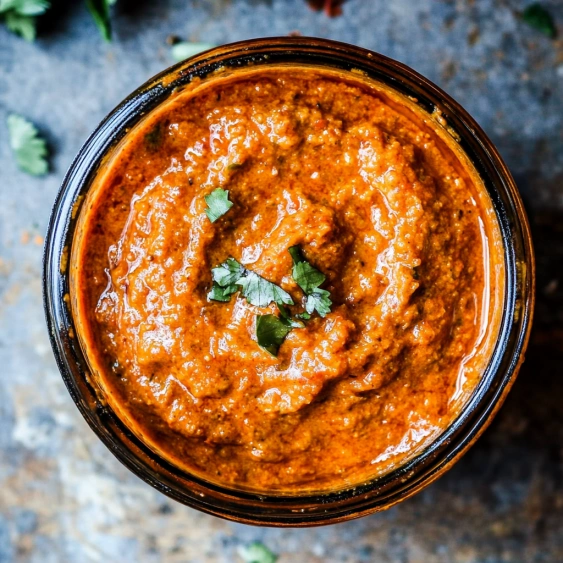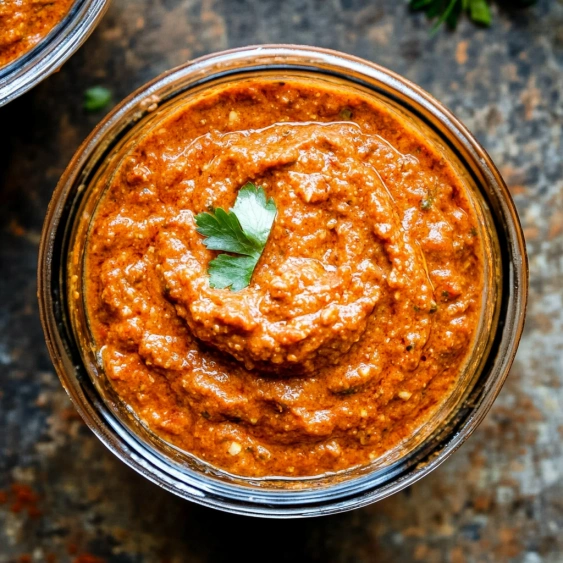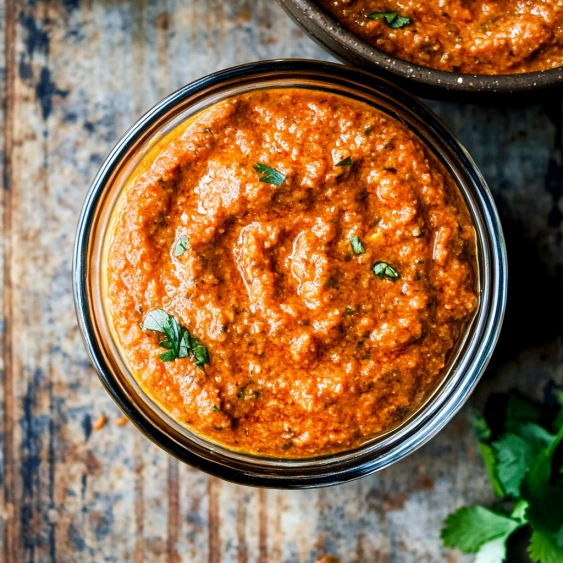 Pin it
Pin it
This homemade harissa paste transforms simple ingredients into a vibrant, flavorful condiment that elevates everything from roasted vegetables to grilled meats. The deep, smoky notes combined with spicy heat create a versatile addition to your culinary arsenal that store-bought versions simply can't match.
I first made this harissa when planning a Moroccan-themed dinner party, and it's become my secret weapon in the kitchen. Guests always ask for the recipe when they taste the depth it brings to even the simplest dishes.
Ingredients
- Red bell peppers: The roasting process brings out natural sweetness that balances the heat perfectly
- Coriander seeds: These provide a citrusy floral note that's essential to authentic harissa
- Cumin seeds: Toasting them enhances their earthy warmth that forms the backbone of the paste
- Olive oil: Use a good quality variety since it impacts the final flavor significantly
- Onion: Provides a savory foundation when caramelized properly
- Garlic: Fresh cloves add pungent depth that mellows beautifully during cooking
- Hot red chiles: The heat source that can be adjusted to your preference
- Lemon juice: Brightens all flavors and provides necessary acidity
- Kosher salt: Enhances all other ingredients and balances the final paste
Step-by-Step Instructions
- Roast the Peppers:
- Preheat your oven to 450°F. Place halved bell peppers on a parchment-lined baking sheet with cut sides down. Roast until the skins blacken and blister, about 20-25 minutes. The charring process is crucial as it develops smoky flavor that defines great harissa. Transfer to a bowl and cover immediately to trap steam, which loosens the skins. Once cooled, gently peel away and discard the skins.
- Toast the Spices:
- Heat a small, dry skillet over medium heat. Add coriander and cumin seeds, shaking the pan frequently to prevent burning. Toast until they darken slightly and release their fragrant oils, about 2-3 minutes. The kitchen should fill with their aromatic scent. Transfer to a mortar and pestle and grind to a fine powder, working in a circular motion until no whole seeds remain.
- Caramelize Aromatics:
- Heat olive oil in a large skillet over medium heat. Add chopped onion, garlic, and chiles, stirring occasionally to promote even browning. Cook for 10-12 minutes until edges begin to caramelize and mixture softens completely. This slow cooking develops sweet, complex flavors that form the foundation of your harissa.
- Blend Everything:
- Combine roasted peppers, ground spices, caramelized aromatics, lemon juice and salt in a blender or food processor. Pulse initially to combine, then blend until completely smooth, stopping to scrape down sides as needed. Add additional olive oil in a slow stream while blending until desired consistency is reached. Taste and adjust seasoning with more salt, lemon juice or oil until perfectly balanced.
 Pin it
Pin it
The roasted red peppers are truly the heart of this recipe. I discovered their importance while traveling through Tunisia, where a local cook showed me how proper roasting creates that distinctive smoky undertone that makes authentic harissa so special.
Storage and Shelf Life
Proper storage is crucial for maintaining harissa's vibrant flavors. Store your finished paste in a sterilized glass jar with a tight-fitting lid. Pour a thin layer of olive oil on top to create a seal that prevents oxidation. Refrigerated this way, your harissa will keep for up to 3 weeks. For longer storage, freeze portions in ice cube trays, then transfer frozen cubes to freezer bags where they'll keep for up to 6 months.
Customizing Your Heat Level
This recipe offers tremendous flexibility in spice level. For a mild version that still delivers authentic flavor, remove seeds and membranes from your chiles before chopping. Using standard red chiles creates moderate heat, while substituting habaneros or scotch bonnets will produce an intensely spicy version. You can also adjust heat by varying the ratio of bell peppers to hot peppers. Remember that harissa's heat intensifies slightly after a day or two in the refrigerator.
 Pin it
Pin it
Traditional Uses
In North African cuisine, harissa serves as both condiment and ingredient. Stir a spoonful into soups and stews during the last few minutes of cooking to add depth without overwhelming other flavors. Blend with olive oil to create a marinade for chicken, lamb, or fish. For a traditional Tunisian breakfast, spread harissa on bread and top with olive oil and a soft-boiled egg. It also makes an excellent addition to hummus, yogurt dips, or salad dressings when you want to add complexity and heat.
Frequently Asked Questions
- → What can I use harissa paste for?
Harissa paste is incredibly versatile. Use it as a marinade for meats and vegetables, stir it into soups and stews for depth, mix with yogurt for a spicy dip, spread on sandwiches, or toss with roasted vegetables. It's particularly delicious with eggs, couscous dishes, and grilled meats.
- → Can I adjust the spice level of harissa?
Absolutely! Adjust the heat by varying the number and type of hot chiles. For milder harissa, remove the seeds from the chiles or substitute part of them with more bell peppers. For extra heat, include the seeds or use hotter chile varieties like Thai bird's eye or habanero.
- → How long does homemade harissa paste last?
When stored in a sterilized jar and covered with a thin layer of olive oil on top, homemade harissa paste will keep in the refrigerator for up to 2 weeks. For longer storage, freeze portions in ice cube trays, then transfer to freezer bags for up to 3 months.
- → Can I substitute dried chiles for fresh ones?
Yes, dried chiles work well in harissa paste. Soak about 10-15 dried chiles in hot water for 30 minutes until soft, then drain before using. This often produces a deeper, smokier flavor profile compared to fresh chiles.
- → What's the difference between harissa paste and harissa sauce?
Harissa paste is concentrated and thick, made primarily from chiles and spices. Harissa sauce is generally thinner, often containing more oil or tomatoes, making it pourable. The paste (as made in this preparation) is more versatile as you can thin it to make sauce, but you can't concentrate a sauce into paste.
- → Are there traditional variations of harissa?
Yes, harissa varies throughout North Africa. Tunisian harissa often includes caraway seeds alongside cumin and coriander. Moroccan versions might incorporate preserved lemons or saffron. Some regional variations add tomatoes, rose petals, or different herb combinations like mint or cilantro.
